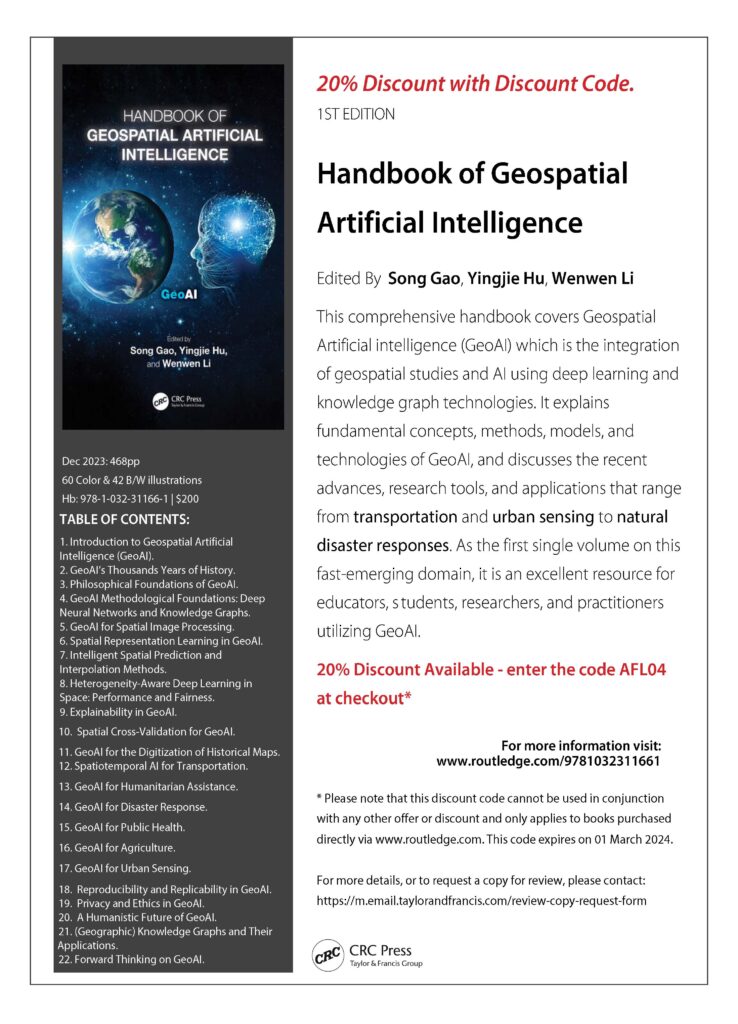The new “Handbook of Geospatial Artificial Intelligence” edited By Drs. Song Gao (University of Wisconsin-Madison), Yingjie Hu (University at Buffalo), and Wenwen Li (Arizona State University) is now published! Dr. Michael F. Goodchild (University of California-Santa Barbara) wrote a Foreword to provide a historic context and recent advances to help the reader to understand the significant shift in the geographic sciences with AI.
This comprehensive handbook covers Geospatial Artificial Intelligence (GeoAI), which is the integration of geospatial studies and AI technologies such as machine (deep) learning and knowledge graph. It explains key fundamental concepts, methods, models, and technologies of GeoAI, and discusses the recent advances, research tools, and applications that range from environmental observation and social sensing to natural disaster responses. As the first single volume on this fast-emerging domain, the GeoAI handbook is an excellent resource for educators, students, researchers, and practitioners utilizing GeoAI in fields such as information science, environment and natural resources, geosciences, geography, and beyond!

Book chapters and their authors:
Section 1: Historical Roots of GeoAI
Chapter 1: Introduction to Geospatial Artificial Intelligence (GeoAI)
By Song Gao, Yingjie Hu, Wenwen Li
Chapter 2: GeoAI’s Thousand-Year History
By Helen Couclelis
Chapter 3: Philosophical Foundations of GeoAI: Exploring Sustainability, Diversity, and Bias in GeoAI and Spatial Data Science
By Krzysztof Janowicz
Section 2: GeoAI Methods
Chapter 4: GeoAI Methodological Foundations: Deep Neural Networks and Knowledge Graphs
By Song Gao, Jinmeng Rao, Yunlei Liang, Yuhao Kang, Jiawei Zhu, Rui Zhu
Chapter 5: GeoAI for Spatial Image Processing
By Samantha T. Arundel, Kevin G. McKeehan, Wenwen Li, Zhining Gu
Chapter 6: Spatial Representation Learning in GeoAI
By Gengchen Mai, Ziyuan Li, Ni Lao
Chapter 7: Intelligent Spatial Prediction and Interpolation Methods
By Di Zhu, Guofeng Cao
Chapter 8: Heterogeneity-Aware Deep Learning in Space: Performance and Fairness
By Yiqun Xie, Xiaowei Jia, Weiye Chen, Erhu He
Chapter 9: Explainability in GeoAI
By Ximeng Cheng, Marc Vischer, Zachary Schellin, Leila Arras, Monique M. Kuglitsch, Wojciech Samek, Jackie Ma
Chapter 10: Spatial Cross-Validation for GeoAI
By Kai Sun, Yingjie Hu, Gaurish Lakhanpal, Ryan Zhenqi Zhou
Section 3: GeoAI Applications
Chapter 11: GeoAI for the Digitization of Historical Maps
By Yao-Yi Chiang, Muhao Chen, Weiwei Duan, Jina Kim, Craig A. Knoblock, Stefan Leyk, Zekun Li, Yijun Lin, Min Namgung, Basel Shbita, Johannes H. Uhl
Chapter 12: Spatiotemporal AI for Transportation
By Tao Cheng, James Haworth, Mustafa Can Ozkan
Chapter 13: GeoAI for Humanitarian Assistance
By Philipe A. Dias, Thomaz Kobayashi-Carvalhaes, Sarah Walters, Tyler Frazier, Carson Woody, Sreelekha Guggilam, Daniel Adams, Abhishek Potnis, Dalton Lunga
Chapter 14: GeoAI for Disaster Response
By Lei Zou, Ali Mostafavi, Bing Zhou, Binbin Lin, Debayan Mandal, Mingzheng Yang, Joynal Abedin, Heng Cai
Chapter 15: GeoAI for Public Health
By Andreas Züfle, Taylor Anderson, Hamdi Kavak, Dieter Pfoser, Joon-Seok Kim, Amira Roess
Chapter 16: GeoAI for Agriculture
By Chishan Zhang, Chunyuan Diao, Tianci Guo
Chapter 17: GeoAI for Urban Sensing
By Filip Biljecki
Section 4: Perspectives for the Future of GeoAI
Chapter 18: Reproducibility and Replicability in GeoAI
By Peter Kedron, Tyler D. Hoffman, Sarah Bardin
Chapter 19: Privacy and Ethics in GeoAI
By Grant McKenzie, Hongyu Zhang, Sébastien Gambs
Chapter 20: A Humanistic Future of GeoAI
By Bo Zhao, Jiaxin Feng
Chapter 21: Fast Forward from Data to Insight: (Geographic) Knowledge Graphs and Their Applications
By Krzysztof Janowicz, Kitty Currier, Cogan Shimizu, Rui Zhu, Meilin Shi, Colby K. Fisher, Dean Rehberger, Pascal Hitzler, Zilong Liu, Shirly Stephen
Chapter 22: Forward Thinking on GeoAI
By Shawn Newsam